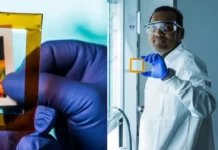
Plastic continues to make big news, especially in Connecticut where a single-use plastic bag fee took effect on August 1st. With estimates of 4.8 to 12.7 million tons of plastic finding its way to the world’s oceans in a single year, the single-use plastic bag fee is aimed to reduce the amount of plastic used throughout the state. The measure has stirred up questions about plastics and their environmental impacts. UConn associate professor of chemistry Nicholas Leadbeater is here to help answer some of these questions.
Q: Why are plastics so bad for the environment? Do they eventually degrade? If so, how long does it take?
A: Regular plastics with none of these additives put in them take a really long time to degrade – like hundreds of years. Regular plastics with the additives can be tuned to degrade in a few months. Bioplastics can degrade fast or slow (in the case of durable plastics). Compostable plastics can degrade in 3-6 months.
Q: What is plastic, anyway? How is it made?
A: In broad terms, plastics are polymers. Polymers are made up of repeating units of small molecules joined together to make big chains. This can include other natural molecules like DNA and proteins, which count as polymers too. Not all polymers are plastic. Polymers come in all sorts of shapes and forms and can be used for a range of different applications, one of which is in making plastic bags. The majority of plastic polymers come from fossil fuel precursors, that is to say the come from crude oil.
Q: Can you tell us about bioplastics, biodegradable, and compostable plastics and how they differ?
A: These classes of plastics basically come from polymers that are made from biologically-derived starting materials such as vegetable fats and oils, straw, woodchips, sawdust and other such things. They are basically “made” by living organisms.
Not all bioplastics readily decompose nor do all regular plastics not decompose. Some bioplastics have long lifetimes and are called “durable”. Some do have shorter lifetimes and decompose more readily. When it comes to regular plastics, they can be made biodegradable by adding compounds to them in the production stage that cause them to disintegrate gradually in the presence of light or oxygen. However what they degrade down to can be nasty.
Compostable plastics are, as the name suggests, plastics that can be composted down. The majority come from renewable feed stocks such as corn and soy, but some can come from oil-derived materials with the addition of things that microbes will eat and so can be composted, sometimes in specialized facilities, sometimes in home compost bins.
Q: Can you foresee any unintended consequences for the plastic bag tax?
A: I know I’m not alone in using my supermarket plastic bags to do things such as line garbage containers. These plastic bags, although bad for the environment, are very thin. If we don’t have them, perhaps people will turn to buying trash bags and these are thicker plastic so end up causing more of a problem.
If people use paper bags instead of plastic for carrying their food, there is the issue of paper bags actually often being worse for the environment than the plastic ones – the manufacturing process requires a lot of energy, water, and trees.
Q: Are measures like the single-use plastic bag fee demonizing plastic unnecessarily?
A: A bag whose sole job is to carry stuff the ten minutes between the grocery store and home clearly is not the best use of a non-renewable plastic feedstock, but there are some parts of life where plastic plays an important role, and indeed is the best option. Water used to be transported using lead pipes. That has serious health implications. The next generation of pipes were made of steel, but they can rust and break after years in the elements underground. Plastic pipes offer an alternative that is safe, lightweight, and robust. Components made of plastic have revolutionized the transportation industry, making cars, trains, and planes safer, more fuel efficient, and robust. Even simple plastic films have an important role – they help protect food, prolonging its lifetime and helping control foodborne illness. So, in the right place, plastics are important. Maybe the ban on single-use plastic bags should prompt us to get something else that incorporates this material in a better way – a durable reusable shopping bag.
Read more: Q&A: The Truth About Plastic
Image courtesy of uconn.edu
Related Links:
US Military Researches Water Bottle Recycling for 3D Printing in the Field
Plastic-eating protein could bring about recycling revolution










